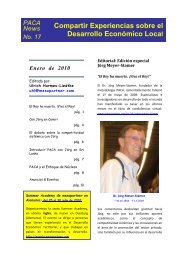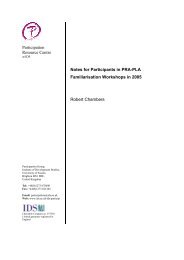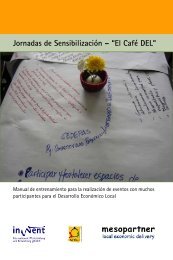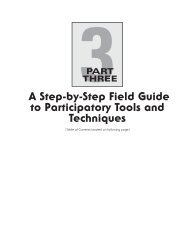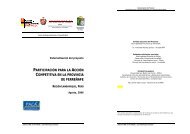McCormick+Schmitz Handbook for value chain research on - PACA
McCormick+Schmitz Handbook for value chain research on - PACA
McCormick+Schmitz Handbook for value chain research on - PACA
You also want an ePaper? Increase the reach of your titles
YUMPU automatically turns print PDFs into web optimized ePapers that Google loves.
the society. Neils<strong>on</strong> (1990: 20) claims that “to c<strong>on</strong>sciously adopt a woman’s perspective<br />
means to see things <strong>on</strong>e did not see be<str<strong>on</strong>g>for</str<strong>on</strong>g>e and also to see the familiar rather differently.”<br />
Feminist <str<strong>on</strong>g>research</str<strong>on</strong>g> recognises that in most societies women are subordinated to men. This<br />
means that the perspective of a woman is not just different from that of a man in some<br />
neutral sense. Rather it reflects her situati<strong>on</strong> as a member of a disadvantaged group.<br />
Feminist <str<strong>on</strong>g>research</str<strong>on</strong>g> starts by seeking a more complete understanding of reality, especially<br />
the impact of gendered instituti<strong>on</strong>s <strong>on</strong> people’s lives. It does not, however, stop there.<br />
Feminist <str<strong>on</strong>g>research</str<strong>on</strong>g> also c<strong>on</strong>cerns itself with c<strong>on</strong>sciousness raising and with using <str<strong>on</strong>g>research</str<strong>on</strong>g><br />
to empower women and trans<str<strong>on</strong>g>for</str<strong>on</strong>g>m society.<br />
The orientati<strong>on</strong> of feminist <str<strong>on</strong>g>research</str<strong>on</strong>g> affects its methodologies. For <strong>on</strong>e thing, feminist<br />
scholars allow themselves to enter into the situati<strong>on</strong> of the <str<strong>on</strong>g>research</str<strong>on</strong>g>ed in ways that might<br />
be seen as inappropriate in traditi<strong>on</strong>al <str<strong>on</strong>g>research</str<strong>on</strong>g>, where objectivity is believed to require<br />
strict separati<strong>on</strong> of <str<strong>on</strong>g>research</str<strong>on</strong>g>er and <str<strong>on</strong>g>research</str<strong>on</strong>g> subject. Especially, but not <strong>on</strong>ly, when both<br />
<str<strong>on</strong>g>research</str<strong>on</strong>g>er and resp<strong>on</strong>dent are women, occasi<strong>on</strong>s may arise in which the <str<strong>on</strong>g>research</str<strong>on</strong>g>er is in a<br />
positi<strong>on</strong> to share experiences and/or knowledge with the resp<strong>on</strong>dent in ways that aim at<br />
increasing her power. Viewed as a violati<strong>on</strong> of the strict separati<strong>on</strong> of <str<strong>on</strong>g>research</str<strong>on</strong>g>er and<br />
subject in c<strong>on</strong>venti<strong>on</strong>al <str<strong>on</strong>g>research</str<strong>on</strong>g>, this would be acceptable and even expected in the<br />
c<strong>on</strong>text of feminist <str<strong>on</strong>g>research</str<strong>on</strong>g>. It should be emphasised here that the c<strong>on</strong>sciousness raising<br />
and learning go both ways. Researchers report having learned a great deal about their own<br />
reality when the c<strong>on</strong>diti<strong>on</strong>s were right <str<strong>on</strong>g>for</str<strong>on</strong>g> give and take with resp<strong>on</strong>dents.<br />
Feminist <str<strong>on</strong>g>research</str<strong>on</strong>g> borrows many of its data collecti<strong>on</strong> methods from traditi<strong>on</strong>al and<br />
participatory <str<strong>on</strong>g>research</str<strong>on</strong>g>, but tends to emphasise the qualitative over the quantitative<br />
approaches. Feminist scholars analyse sec<strong>on</strong>dary sources, interview key in<str<strong>on</strong>g>for</str<strong>on</strong>g>mants,<br />
engage in participant observati<strong>on</strong>; they may even administer surveys. To these they add<br />
visual methods, c<strong>on</strong>versati<strong>on</strong>al analysis, and other participatory and qualitative methods.<br />
Triangulati<strong>on</strong> allows them to test their own findings. This allows <str<strong>on</strong>g>for</str<strong>on</strong>g> the interacti<strong>on</strong> of<br />
quantitative and qualitative methods. It is especially important in cases where rejecti<strong>on</strong> of<br />
certain accepted methods leaves feminist <str<strong>on</strong>g>research</str<strong>on</strong>g>ers open to the criticism of being<br />
‘unscientific.’<br />
122




